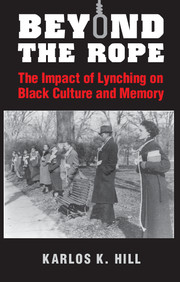Conclusion
Published online by Cambridge University Press: 05 July 2016
Summary
Since the 1880s, African Americans have made sense of the lynching of blacks in differing ways. Those understandings have ranged from conceiving of the violence against blacks as warranted lynchings, unwarranted lynchings, victimization narratives, and consoling narratives. Because black understandings of the lynched black body have evolved over time, the lynched black body is best understood as a floating signifier. Despite this varied history, the lynched black body in post–civil rights American culture is typically understood as a symbol of extreme white racism and black suffering. To be sure, this is one of the ways in which the NAACP and other black activists of the early twentieth century wanted Americans to engage with the lynched black body. The cultural staying power of the victimization narrative of the lynched black body is a testament to their decades of organizing. However, this understanding of the lynched black body is not timeless. This seemingly unmistakable symbol of black victimization and death at the hands of white lynchers was made to do other kinds of work, to convey other meanings – meanings that could actually affirm black humanity. Therefore, the lynched black body as a floating signifier means that the lynched black body in the black cultural imagination has been elastic enough to change with evolving political and cultural needs.
The ways in which African Americans have made sense of the lynched black body has been contingent upon a mix of political circumstances and cultural imperatives. As these characteristics changed, so did black-authored narratives of the lynched black body. For instance, when black vigilantes lynched other blacks because the criminal justice system ignored crimes committed against black Americans, black people believed that violent crimes such as murder and rape warranted lynching. However, as increasing numbers of blacks were lynched by white lynch mobs and whites began to justify lynching on racial grounds – rather than criminal deviance grounds – black people pivoted from embracing black vigilantism to condemning it. Moreover, in the late nineteenth and early twentieth century context in which the lynched black body had been stigmatized as black beast rapist, black Americans mobilized alternative narratives such as the victimization narrative.
- Type
- Chapter
- Information
- Beyond the RopeThe Impact of Lynching on Black Culture and Memory, pp. 119 - 122Publisher: Cambridge University PressPrint publication year: 2016



